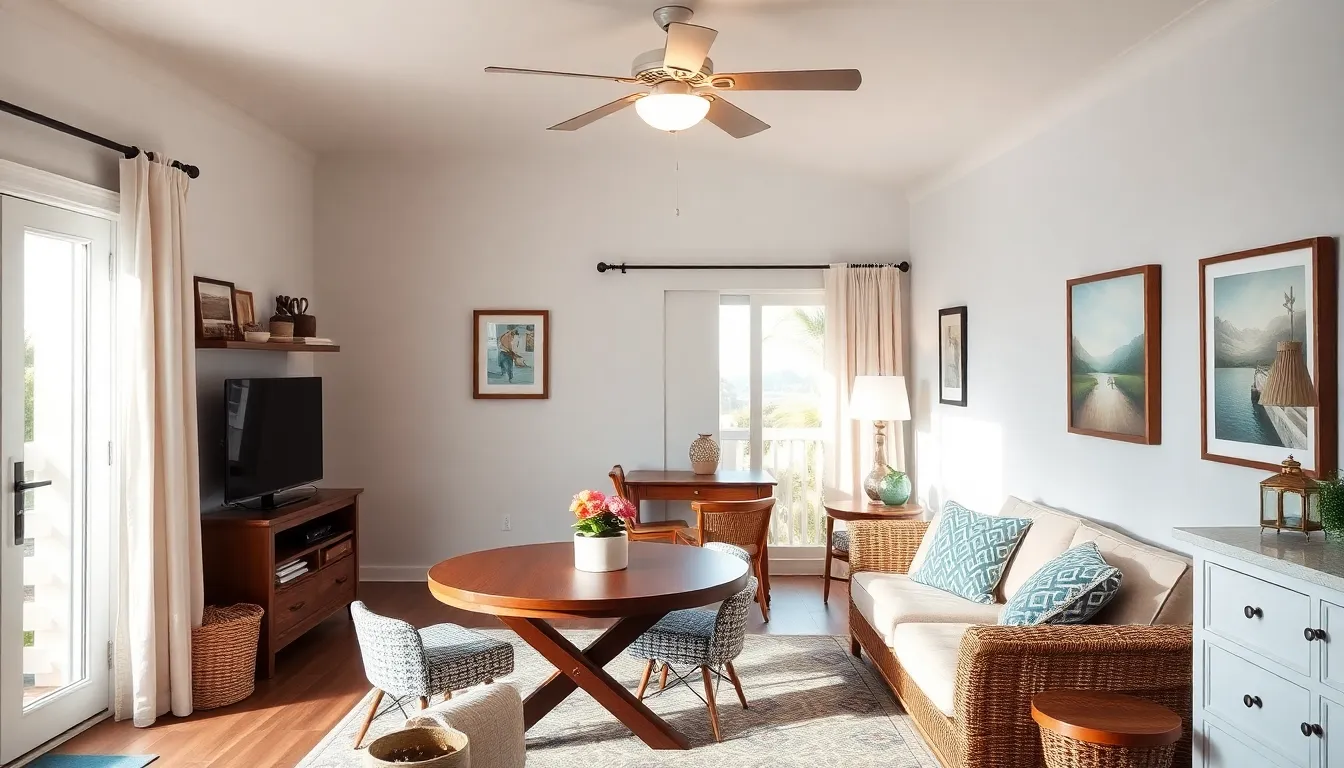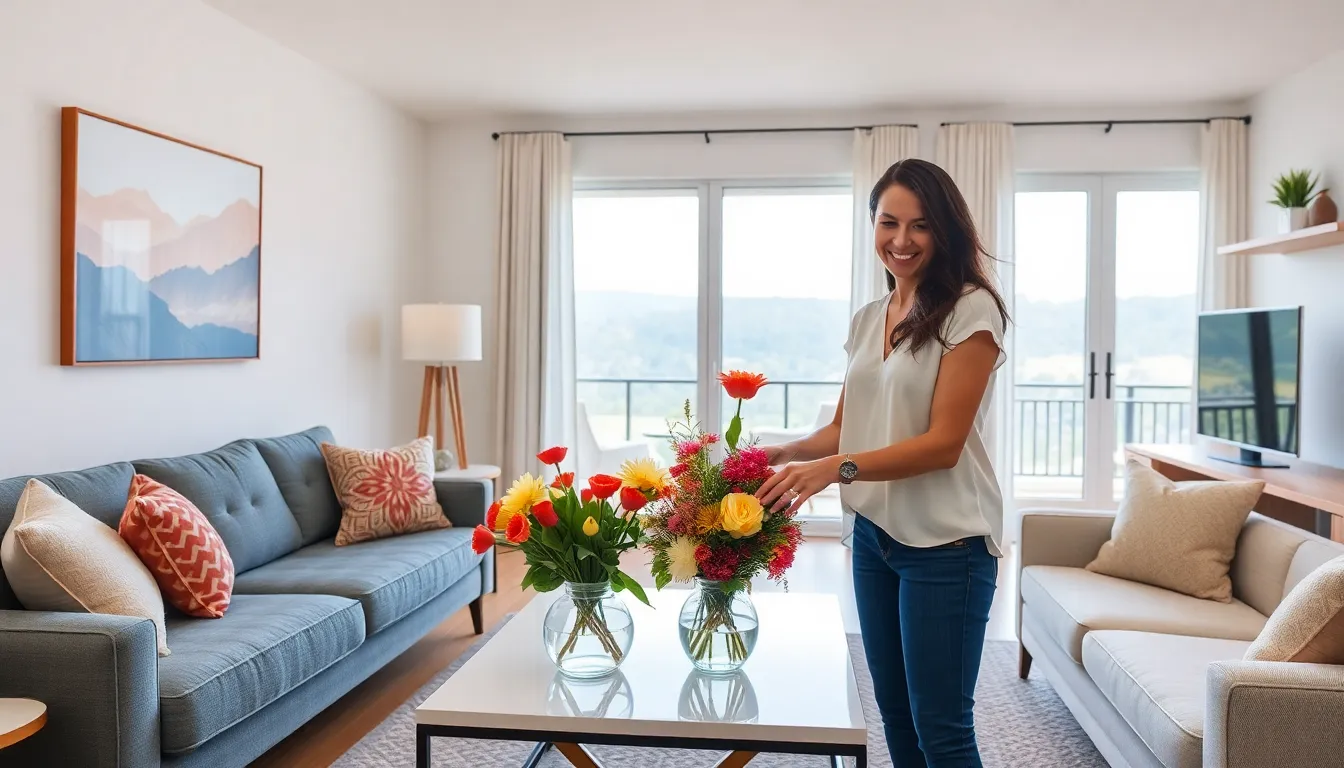Table of Contents
ToggleRenting out a vacation home can feel like a walk on a tightrope—exciting yet a bit nerve-wracking. It’s not just about listing your property and waiting for the cash to roll in; it’s about creating an unforgettable experience for your guests while ensuring your home stays in tip-top shape. After all, nobody wants a surprise visit from a family of raccoons in the attic or a guest who thinks the fancy wine glasses are part of a scavenger hunt!
Understanding Your Target Market
Understanding the target market is vital for renting a vacation home effectively. Focusing on guest preferences leads to better experiences and increased bookings.
Identifying Potential Renters
Identify demographics and psychographics to pinpoint potential renters. Families often seek spacious accommodations with convenient amenities. Couples usually prefer romantic settings with privacy. Professionals often look for properties near business districts. Researchers indicate that seasonal trends influence preferences, so adapt listings accordingly. Gathering feedback from previous guests can uncover specific desires and habits, enabling tailored approaches in marketing.
Analyzing Rental Trends
Analyze rental trends to remain competitive and relevant. Seasonal fluctuations often dictate availability and pricing strategies. Popular vacation areas may experience higher demand during holidays or festivals, driving pricing adjustments. Tracking competitor rates helps ensure offers align with market standards. Online platforms provide valuable insights, revealing guest preferences and search behaviors. Regularly reviewing data allows for informed decisions, ultimately maximizing occupancy rates and rental income.
Preparing Your Vacation Home

Creating an inviting atmosphere is essential for attracting guests. Ensuring the home is in top condition significantly enhances the rental experience.
Necessary Renovations and Repairs
Prioritize necessary renovations to maintain property appeal. Address structural issues promptly, like leaky roofs or damaged flooring, which can deter potential renters. Updating electrical systems improves safety, while fresh paint revitalizes rooms and creates a welcoming space. Swap outdated appliances for energy-efficient models, attracting eco-conscious guests. Consider adding modern amenities such as high-speed internet or smart home technology, enhancing the overall experience. Lastly, conduct regular inspections to identify and fix minor repairs before they escalate.
Furnishing and Decorating Tips
Choose furnishings that blend comfort with style. Select durable and easy-to-clean materials to withstand guest wear and tear. Incorporate a cohesive color scheme that matches the home’s architecture and surroundings, creating a harmonious feel. Add functional furniture, such as sofa beds or extendable dining tables, catering to various group sizes. Include personal touches like local artwork or decorative items, giving guests a sense of place. Brighten spaces with adequate lighting and fresh linens, ensuring a clean and inviting atmosphere.
Setting the Right Rental Price
Setting the right rental price for a vacation home plays a crucial role in attracting guests and maximizing income. This process involves thorough research and careful consideration of various factors.
Researching Comparable Rentals
Analyzing similar vacation rentals in the area provides essential insights. Start by examining listings on platforms like Airbnb and Vrbo to gauge pricing strategies. Check additional features such as location, amenities, and seasonal demand. Reviewing review ratings can help identify successful pricing trends. Collecting data from at least five comparable listings enhances accuracy. Using this information allows owners to position their rental competitively within the market.
Factors to Consider in Pricing
Multiple factors influence the rental price of a vacation home. Location impacts desirability; beachfront properties often command higher rates. Property size and capacity also affect pricing, as larger homes accommodate more guests. Seasonal fluctuations play an important role; peak travel seasons generally correlate with elevated prices. Additionally, unique amenities, such as pools or hot tubs, can justify a premium. Understanding local events helps guests plan visits and influences pricing adjustments. Regularly refining the rental price based on market trends ensures competitiveness and maximizes occupancy.
Effective Marketing Strategies
Utilizing effective marketing strategies enhances visibility and attracts potential guests. Employing the right tactics ensures a successful rental experience.
Online Platforms for Listing
Popular platforms for vacation rentals include Airbnb, Vrbo, and Booking.com. Each platform caters to different audiences, expanding reach. Listing properties on multiple sites increases exposure and maximizes occupancy rates. Optimizing listings with high-quality images and engaging descriptions captures attention. Regularly updating availability and responding quickly to inquiries builds credibility. Utilizing platform-specific SEO techniques improves searchability, ensuring the property appears in relevant searches. It’s essential to read platform guidelines carefully to maximize benefits and protect against issues that might arise.
Highlighting Unique Features
Showcasing unique features creates a competitive edge. Guests appreciate standout elements, such as hot tubs, panoramic views, or proximity to attractions. Including detailed descriptions of these features in listings attracts more interest. Highlighting family-friendly amenities or unique décor can appeal to specific groups. Using quality photography emphasizes these enticing aspects, making the property more memorable. Sharing guest testimonials that mention these features fosters trust as prospective guests envision their experience. Ultimately, prioritizing unique offerings helps differentiate the vacation home in a crowded market.
Managing Guest Relationships
Building strong relationships with guests enhances their experience and encourages positive reviews. Establishing clear communication from the outset is vital.
Communicating with Renters
Respond promptly to inquiries for effective communication. Clarifying expectations regarding house rules, check-in details, and amenities fosters transparency. Using a friendly tone can make guests feel more welcomed. Offering your contact information allows for easy communication during their stay. Regular updates on local attractions or events enhance engagement. Personalizing messages with the guest’s name can create a more welcoming atmosphere.
Check-In and Check-Out Procedures
Simplified check-in and check-out processes enhance guest satisfaction. Providing clear instructions on accessing the property eliminates confusion. Utilizing a keyless entry system can streamline check-in, allowing flexibility for guests. Setting a specific check-out time helps manage cleaning schedules effectively. Sending reminders about check-out procedures can prevent misunderstandings. Encouraging feedback during these times fosters open communication, supporting future improvements.
Maintaining Your Property
Maintaining a vacation home involves regular upkeep and quick responses to any issues that arise. Prioritizing maintenance tasks helps ensure guest satisfaction and prolongs the property’s lifespan.
Regular Maintenance Tips
Scheduled inspections for appliances, plumbing, and electrical systems prevent larger issues. Checking HVAC functionality ensures comfort for guests throughout the year. Landscaping may require consistent attention, especially for properties with outdoor amenities. Routine cleaning two to three times each season keeps the property inviting. It’s also beneficial to replace worn-out linens and towels regularly to enhance the guest experience. Address minor repairs immediately to avoid escalation into costly fixes. Guests appreciate well-functioning items and a tidy environment.
Handling Emergencies
Quickly addressing emergencies maintains a positive guest experience. Preparation involves having a local maintenance contact who can respond to urgent situations. Posting emergency contact numbers in the property helps guests access assistance easily. Fire alarms and carbon monoxide detectors must function correctly for the safety of everyone. Knowing how to shut off water or electricity can prevent property damage in crises. Reviewing recent emergency procedures with staff or cleaning crews ensures everyone knows their role. Annual emergency drills for the property may identify weaknesses in the response plan. Adapting to unexpected situations fosters guest trust.
Renting a vacation home can be a rewarding venture when approached with the right strategies. By focusing on guest experience and maintaining the property, hosts can build lasting relationships and encourage repeat bookings. Understanding the target market and keeping an eye on rental trends will help optimize pricing and enhance visibility.
Effective marketing and communication play vital roles in attracting guests and ensuring their satisfaction. Regular maintenance and prompt responses to issues not only protect the property but also foster trust with guests. With thoughtful preparation and management, a vacation home can become a profitable and enjoyable asset.








